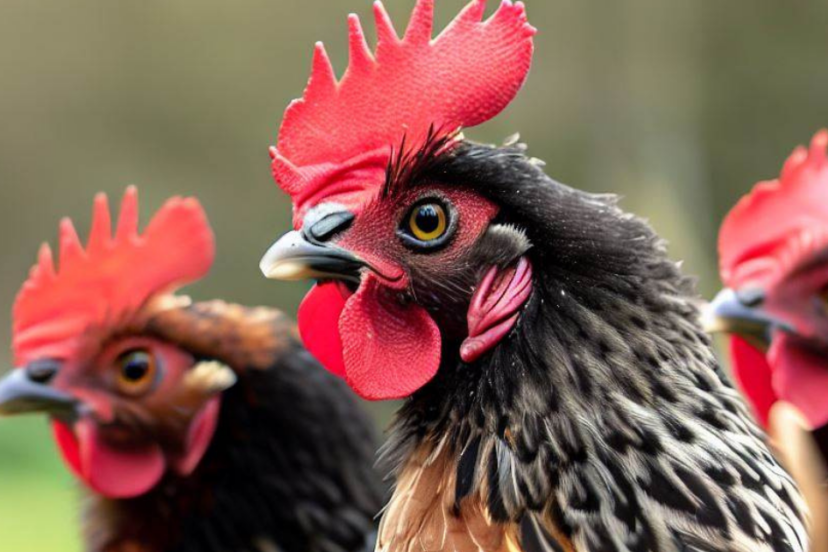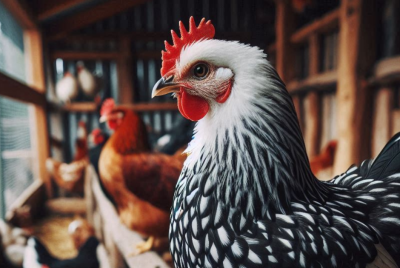Barnevelder chickens have always fascinated me with their unique and captivating characteristics. As an enthusiast and advisor in the world of poultry, I am excited to share my knowledge and experience with you. Barnevelder chickens are truly a breed worth considering for any poultry enthusiast. Their stunning appearance, exceptional egg-laying abilities, and friendly temperament make them a fantastic addition to any backyard flock.
Getting to Know Barnevelder Chickens
Appearance
Barnevelder chickens have a rich history that dates back to the early 20th century in the Netherlands. They were named after the small Dutch town of Barneveld. These chickens are known for their striking double-laced feather patterns and sturdy build. The glossy black feathers with hints of iridescent green, combined with the intricate lacing of brown or gold, make them a sight to behold.
Apart from their remarkable appearance, Barnevelder chickens are known for their calm and friendly nature. They easily adapt to various climates, which makes them suitable for both urban and rural environments. Their docile temperament also makes them excellent companions for families with children.
The Black Copper Maran is the breed that closely resembles the Barnevelder in terms of some characteristics. Both breeds are known for their beautiful plumage coloration, with black feathers and copper accents. They are also both recognized for their ability to lay dark brown eggs.
While the Black Copper Maran and Barnevelder have some similarities, it’s important to note that they are distinct breeds with their own unique traits. The Barnevelder is known for its double-laced feather pattern, gentle temperament, and excellent egg-laying capabilities. On the other hand, the Black Copper Maran is known for its robust build, hardiness, and richly colored eggs.
Although they may share some visual similarities, it’s essential to consider the specific breed characteristics and traits when choosing chickens for your flock.
Benefits of Raising Barnevelders
Advantages
One of the significant advantages of raising Barnevelder chickens is their excellent egg-laying capabilities. A single Barnevelder hen can lay approximately 180 to 200 large brown eggs per year. These eggs are not only abundant but also known for their exceptional taste and quality. If you enjoy fresh eggs for breakfast or baking, Barnevelders won’t disappoint you.
In addition to their egg-laying abilities, they are also admired for their exhibition potential. Their beautiful plumage and distinct color patterns make them a favorite among poultry show enthusiasts. Whether you want to showcase your chickens or simply enjoy their stunning presence in your backyard, they are a perfect choice.
Selecting the Right Barnevelder Breed
When it comes to selecting the right breed, you have several options to consider. The most common varieties are Double Laced, Single Laced, and Silver. Each breed has its unique traits and appearances. The Double Laced Barnevelders feature a beautiful black and brown double-laced pattern, while the Single Laced Barnevelders display a similar pattern in a single color. The Silver Barnevelders, on the other hand, have a stunning silver coloration with subtle lacing.
The choice of breed ultimately depends on your personal preferences and objectives. If you’re looking for a breed that truly stands out with its intricate feather patterns, the Double Laced or Single Laced Barnevelders will be an excellent choice. If you prefer a more subtle and elegant appearance, the Silver Barnevelders might be the perfect fit for your flock.
Creating an Ideal Environment
To ensure the well-being of your Barnevelder chickens, it’s essential to provide them with a suitable housing environment. A well-designed chicken coop is crucial to their health and happiness. Barnevelders require adequate space to roam, scratch, and dust bathe. The coop should be well-ventilated to prevent moisture buildup and provide good air circulation.
Additionally, nesting areas with comfortable bedding should be provided for egg-laying. Barnevelders are generally excellent foragers, so having access to a secure outdoor area is highly beneficial. Consider using wire mesh to protect them from predators while allowing them to enjoy the benefits of free-ranging.
Feeding and Nutrition
Proper nutrition is vital for the overall health and productivity of your Barnevelder chickens. A balanced diet is essential to ensure optimal egg production and overall well-being. A combination of high-quality commercial feeds and natural supplements is recommended.
A commercial layer feed formulated specifically for chickens is an excellent foundation for their diet. This feed contains the necessary nutrients, vitamins, and minerals to support their egg-laying and overall health. Along with the commercial feed, it’s beneficial to provide Barnevelders with fresh greens, fruits, and vegetables. They enjoy foraging for insects and worms, which adds protein to their diet.
Ensure a constant supply of clean water for your chickens. Water is essential for digestion, egg production, and overall hydration. Regularly check and clean their water containers to prevent contamination.
Healthcare and Disease Prevention
Maintaining the health of your Barnevelder chickens is of utmost importance. Regular health checks and preventive measures can help prevent diseases and ensure a thriving flock. Here are some essential aspects to consider:
Vaccinations:
Consult with a veterinarian or poultry expert to determine the appropriate vaccinations for your chickens. Vaccinations can protect them against common diseases like Marek’s disease and Newcastle disease.
Parasite Control:
Implement a regular deworming and parasite control program to prevent internal and external parasites. Common parasites in chickens include worms, mites, and lice.
Biosecurity:
Practice good biosecurity measures to minimize the risk of disease transmission. This includes quarantining new birds, limiting access to your flock, and maintaining cleanliness and hygiene in the coop.
Observation and Prompt Action:
Regularly observe your chickens for any signs of illness or abnormal behavior. Early detection of health issues allows for prompt intervention and treatment.
Breeding and Caring for Chicks
If you’re interested in breeding Barnevelders, it’s essential to understand the breeding process and provide proper care for the chicks. Here are a few key points to consider:
Breeding Selection:
Choose healthy and genetically diverse breeding stock to ensure strong and robust chicks. Select birds that exhibit the desired traits, such as feather coloration and temperament.
Incubation or Brooding:
Depending on your preference, you can either incubate the eggs using an incubator or allow a broody hen to hatch them naturally. Provide a safe and warm environment for the chicks during the brooding phase.
Nutritional Needs:
Chicks require a specialized starter feed rich in essential nutrients for proper growth and development. Ensure they have access to clean water and a warm, draft-free area.
Socialization:
Socialize the chicks from a young age to help them become accustomed to human interaction. Gentle handling and exposure to different environments will contribute to their overall sociability and ease of handling as they mature.
Closing Remarks
In conclusion, Barnevelder chickens are a remarkable breed with their stunning appearance, excellent egg-laying abilities, and friendly temperament. Whether you’re looking for a backyard companion or a show-worthy bird, Barnevelders are an excellent choice. By creating a suitable environment, providing proper nutrition, and implementing preventive healthcare measures, you can ensure the well-being and productivity of your flock. Embrace the joy of raising Barnevelders and experience the rewards they bring to your poultry endeavors.
FAQs
1. Are Barnevelder chickens suitable for small backyard spaces?
Absolutely! They adapt well to various environments, including small
backyards. They don’t require extensive space and can thrive in urban settings.
2. Do Barnevelder chickens get along well with other chicken breeds?
Yes, They have a friendly temperament and generally get along well with other chicken breeds. Proper introductions and monitoring are important when introducing new birds to an existing flock.
3. How many eggs can I expect from a Barnevelder hen per week?
On average, a Barnevelder hen can lay around 3 to 4 eggs per week, depending on factors such as age, health, and environmental conditions
4. What is the lifespan of Barnevelder chickens?
They have a relatively long lifespan compared to some other chicken breeds. With proper care and nutrition, they can live up to 8 to 10 years.
5. Can Barnevelder chickens tolerate cold climates?
Yes, the chickens are known for their ability to tolerate cold climates. Their dense feathers provide insulation, helping them stay warm during chilly winters.
Remember to consult local regulations and guidelines regarding the ownership and care of chickens in your area. Enjoy the rewarding experience of raising Barnevelder chickens and watch your flock thrive!
*We may earn a commission from purchases made through our links, at no cost to you. This does not affect our product recommendations. Please see our disclosure to learn more.





